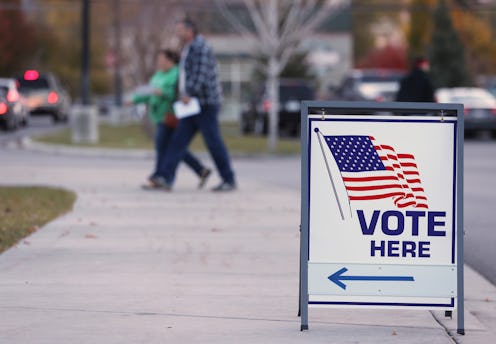
Although polls have already started to close across the country, when 2018 midterm election results will come in varies from state to state. A number of factors — from early voting rates to the closeness of certain races — could impact how long it takes for states to release their election results.
This year's midterm elections could be monumental: a record number of women are running for elected office, Democrats are hoping to take control of the House of Representatives, and candidates in some states may even make history if they win. But according to Newsweek, election results will take some time to trickle in, especially in larger states or in races that are too close to call.
The last polls are not slated to close until after midnight ET, the New York Times reported, though polling locations may also stay open later than expected. Ballots are typically counted once the voting deadline passes in each state. But in more populous states like California, which has high voter turnout as well as high rates of absentee and mail-in voting, results often take longer to be declared. During the 2014 midterm elections, it took more than two weeks after Election Day for California to finalize the results of two House races, per The Sacramento Bee.
Meanwhile, in states with more competitive races — such as Georgia's gubernatorial election between Democrat Stacey Abrams and Republican Brian Kemp — it could take longer to call a race. Local elections officials in Georgia also extended voting hours on Tuesday in order to make up for technical issues and a limited number of available voting machines, which means that this highly contested race will take longer to call.
According to The Guardian, election results can also take longer to finalize in states that require winners to obtain more than 50 percent of the vote. If that condition is not met, the top two candidates must participate in a runoff election, delaying the results.
In order to seize control of the House, Democrats need to flip at least 23 Republican-controlled seats to obtain a majority. In the Senate, the margin is even closer; Democrats would need to hold onto every seat they control that is up for re-election, and pick up at least two additional seats on top of that.
With the exception of races in which candidates are either running uncontested or have posted an insurmountable lead, it will not be possible to call many closely-watched races immediately after polls close. Whatever the results are, though, this year's midterm elections have been widely perceived as a referendum of President Donald Trump's administration. For months, Democrats and other Trump critics have campaigned against Trump's policies on immigration, climate change, and other significant issues. Trump himself has acknowledged this; in Cleveland, he told supporters that "in a sense, I am on the ticket."
All 435 seats in the House of Representatives, as well as 35 of 100 seats in the Senate, are up for grabs on Tuesday.